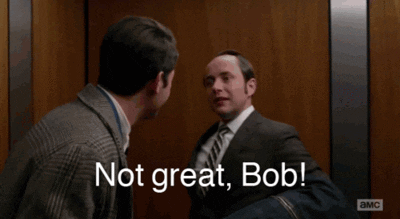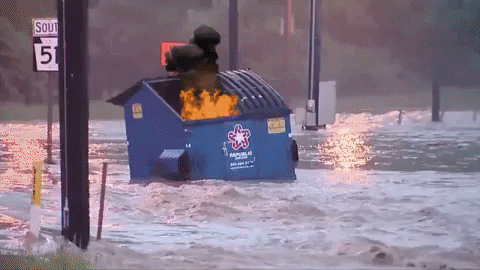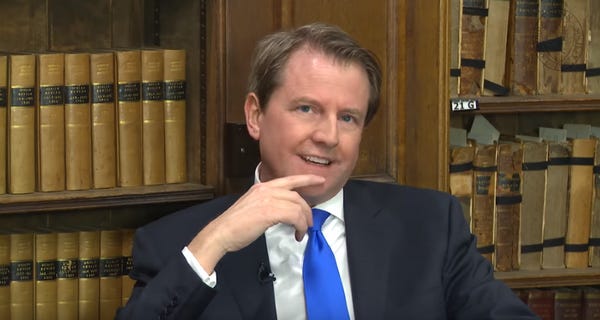DC Circuit Court: What Are We, JUDGES?
Not if it means they'd have to tell Trump that subpoenas are lawful things.
Once again, Trump is trying to act like a king and the judicial branch is doing nothing to stop it.
In a complete abrogation of its constitutional responsibilities, a three-judge panel of the DC Circuit ruled Friday evening that congressional subpoenas really don't mean anything. In House Judiciary Committee v. McGahn , the DC Circuit ruled that the Trump regime can obstruct Congress and there's nothing the court system can do to stop him.
Yeah. Everything is bad.

Let's talk about what happened, here
Last summer, the House Judiciary Committee issued subpoenas to a number of top Trump aides, including former White House counsel Don McGahn. Rather than turn over documents and negotiate with Congress, like every other president under investigation has done, Trump instructed his cronies to obstruct the investigation as much as possible.
Last fall, the DC District Court ordered McGahn to appear . But now, the DC Circuit (the appeals court) has said that's actually totally fine and there's nothing they can do about it.
Awesome.
The two judges in the majority were Thomas Griffith, a baby Bush appointee who wrote the opinion, and Karen Henderson, a daddy Bush appointee who concurred. Judge Judith Rogers, a Clinton appointee, dissented.
The majority finds that it has "no authority to resolve" this dispute between the executive and legislative branches of government. The judiciary, says the court, only has the power to decide disputes between different branches of governments when someone other than just the government is harmed.
In this case, the Committee's dispute with the Executive Branch is unfit for judicial resolution because it has no bearing on the "rights of individuals" or some entity beyond the federal government.
This, of course, ignores the part where every American is harmed when separation of powers breaks down due to an autocratic executive.
Cool.
The opinion also takes care to repeatedly warn of the dangers of deciding this case, while at the same time closing its eyes, plugging its ears, and screaming "LA LA LA LA I CAN'T HEAR YOU" to all of the dangers of its non-decision decision.
In this case, the dangers of judicial involvement are particularly stark. Few cases could so concretely present a direct clash between the political branches. The Committee opened an investigation into possible presidential wrongdoing, which culminated in articles of impeachment against the President. The Committee claims that, in furtherance of this investigation, McGahn must testify about events that occurred during his tenure as White House Counsel. Meanwhile, the President denies all wrongdoing, and he has instructed McGahn not to testify.
The majority also decries the idea of a court *GASP* enforcing subpoenas!
Judicial entanglement in the branches' political affairs would not end here. If the Committee can enforce this subpoena in the courts, chambers of Congress (and their duly authorized committees) can enforce any subpoena.
It's true. If the legislative branch can enforce subpoenas, then it can enforce subpoenas.
Though momentous, the legal issue in this case is quite narrow: whether the President may assert absolute testimonial immunity on behalf of McGahn. But future disagreements may be complicated and fact-intensive, and they will invariably put us in the "awkward position of evaluating the Executive's claims of confidentiality and autonomy[.]"
It's almost like that's the court's job or something!
Of course, as Judge Rogers points out in the dissent, courts deal with subpoena enforcement ALL THE DAMN TIME.
Subpoena enforcement is a "familiar judicial exercise" with which courts are well-acquainted, because judicial enforcement of a subpoena is an ordinary corollary to civil litigation. [...] Thus, the precise function that the Committee asks the court to perform — determining whether McGahn has a valid excuse for failing to appear before the Committee and compelling his compliance if he does not — is a commonplace feature of civil litigation in federal court. In exercising jurisdiction over the Committee's subpoena-enforcement suit, the court does not take sides in an interbranch dispute or involve the court in any political dispute, because the court need only to address whether McGahn must appear before the Committee in response to a valid subpoena; what he does at that point remains to be seen.
But god forbid a court enforce a subpoena when our democracy could be at stake.
So that's just super
This decision is dangerous and will set a very dangerous precedent if it's upheld.
Judge Rogers, the only Democratic appointee on the panel, had some sharp words for her colleagues. As she points out, nothing about the situation that led to this case says great things about our democracy.
For the first time in our history, the President has met the House's attempt to perform its constitutional responsibility with sweeping categorical resistance, instructing all members of the Executive Branch not to cooperate with the House's impeachment inquiry. [...] He has denounced the impeachment investigation as without "[l]egitimate [b]asis[,] and an "unconstitutional effort[] to overturn the democratic process[.] Indeed, at oral argument, McGahn's Department of Justice ("Department") counsel acknowledged that he was unaware of any instance in history in which the President instructed the Executive Branch "not to cooperate in any form or fashion" with a Congressional inquiry.
The President and Congress have traditionally been able to resolve disputes over Congressional desire for Executive Branch documents and testimony. The President's reticence to turn them over here through informal processes of negotiation and give-and-take, as repeatedly proposed by the House Committee, makes clear that the likelihood of the parties privately reaching a mutually acceptable resolution of their dispute over McGahn's testimony seems remote at best. Consequently, the specific injury that the Committee seeks to vindicate before the court is limited to McGahn's defiance of its subpoena by refusing to appear.
A situation like the one we are in is when it's most important for Congress to be able to use its investigatory powers.
In the context of impeachment, when the accuracy and thoroughness of the investigation may well determine whether the President remains in office, the House's need for information is at its zenith[.]
With the majority's decision,
The court removes any incentive for the Executive Branch to engage in the negotiation process seeking accommodation, all but assures future Presidential stonewalling of Congress, and further impairs the House's ability to perform its constitutional duties. [...]
The power to impeach and remove the President from office distinguished the President from a king. Having only recently emerged from a violent revolution precipitated in large part by arbitrary and abusive action by King George III of Great Britain, the Founders well knew the destructive power of unchecked and uncheckable authority in the hands of a single person.

What's next?
Apologies, dear readers, for my prediction in this case is bleak.
Queen Nancy has said that the House will ask the DC Circuit to rehear the case en banc , which means the entire court would take a look at the case, rather than just a three-person panel.
But even if we get the best case scenario at the next step, and the full DC Circuit sits en banc and reverses the panel decision, we're still probably screwed. If history is any indication, at that point, we would get a quick order from SCOTUS granting a stay of the DC Circuit's decision. This would leave the House unable to enforce the McGahn subpoena until the Supreme Court rules — which would allow the conservative Supreme Court to wait until after the 2020 election to make a ruling.
Granting stays to help Trump destroy our country is one of the Roberts Court's favorite hobbies. As Justice Sotomayor recently pointed out , SCOTUS has made a habit of granting stays that benefit Donald Trump.
In the midst of the chaos Donald Trump has thrown us into, far too many people are still acting like we live in a country where politicians play by the rules and have respect for norms and laws.
But here in 2020, we don't live in a country like that anymore. We live in a country where Donald Trump is president and thinks the Constitution says he can do whatever he wants .
The majority in this case actually suggested that the fact that Trump took an oath means he'll live by it. Seriously.
The branches may (and will) disagree in good faith about their obligations to one another; that is the point of a system in which "ambition counteracts ambition." But the legitimate scope of that disagreement is not boundless. Instead, the Constitution binds Members of Congress and the Executive Branch by "Oath or Affirmation," see U.S. CONST. art. II, § 1; id. art. VI; 33 U.S.C. § 3331, and those so bound have a duty to conduct themselves with fidelity to the Constitution.
Yup. We should just trust wannabe fascist executives to follow their oaths. That sounds like a great idea and something that will totally work.
As DC District Judge Ketanji Brown Jackson wrote last November in this very case,
Compulsory appearance by dint of a subpoena is a legal construct, not a political one, and per the Constitution, no one is above the law[.]
Terrible precedent like this doesn't disappear when Trump finally leaves office, either. Make no mistake that the consequences of these bad decisions won't just go away; we'll be stuck with them as precedent for decades to come.
Everything is awful. Maybe this overly dramatic kitten can help us cope.
Oh my god someone made a gif of the tiny dramatic kitten. https: //t.co/drPjOOk8Bd
— Nerd Girl Says (@Nerd Girl Says) 1583079645.0
I feel you, buddy.
Here's the opinion. It's stinky.




What kind of ROI on American assets could they expect at that amount?.... To a x-times bankrupt serial liar?Prepare for the worst here.
I'm not saying they expected the "loan" to be repaid from the ostensible Indonesian project but they certainly expect to get more than $500 million of returns from that transaction. Trump dropped sanctions against ZTE within 72 hours. Why would they abandon that "investment" in Trump and work against Trump's election ?